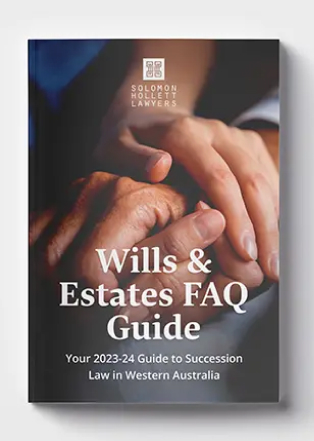The death of a family member or close friend is never easy, and wrapping up the estate can be an enormous task that requires time, diligence and the ability to carefully navigate legal issues that may arise.
You won’t be surprised to learn that contesting a Will can be a stressful and complex process that can have unpredictable outcomes. Beyond the emotional toll and the complexity of contesting a Will, the question of cost also comes in. Who pays to challenge a Will? Is it the Will contester? Is it the challenge defender?
It’s a question we often get during the process, and we want to make sure everyone is going into the process well-informed.
Challenging a Will: the basics
A Will challenge is a legal action taken when there are doubts about the validity of the Will, concerns around the circumstances under which it was created, or if the Will fails to adequately provide for someone the Will maker had a moral obligation to provide for.
Contesting a Will can be difficult for several reasons, one of those being the timing. If you plan to contest a Will by making a Family Provision claim, then you’ll have 6 months from the date of the grant of probate to do so. Once a grant of probate is given to the executor, the Will is authorised to be carried out given that there are no questions surrounding the validity.
If you want to contest a Will in Western Australia after the initial 6 months have elapsed, you will need special permission from the Court to do so, which is unlikely to be granted unless there is a compelling reason that an application was not commenced during the 6 month period.
If you are acting as an executor of Will, it is best practice not to distribute the estate until after the 6 month period has elapsed, so that you know there aren’t any claims waiting in the wings.
If you’re worried about the timing of your claim, it’s good to call on a lawyer to ensure the best chances of success.
Read more about the process to contesting a Will.
Who can challenge a Will?
Not everyone can contest a Will by making a Family Provision claim. In Western Australia, you can only contest a Will if you are an eligible person and believe you have been left without adequate and proper provision in the Will.
According to section 7 of theFamily Provision Act 1972 (WA), an eligible person is one of the following:
- A married partner or de facto partner;
- Someone receiving or entitled to receive maintenance from the recently deceased;
- A child of the deceased; or, under certain circumstances
- A grandchild, stepchild or a parent of the deceased.
The Supreme Court looks at these types of claims by breaking them down into a two-limb test. First, the Court will decide if whatever was left to the claimant by the deceased person (if anything) was a proper and adequate provision.
Secondly, the Court (if satisfied that the provision was inadequate) will exercise its discretion to alter the distribution of the estate to ensure that the provision is proper and adequate for the claimant’s needs (having regard to a whole raft of factors, including the financial position of the claimant and other beneficiaries, the size of the estate and the relationship between the deceased person and the claimant, among other things).
If you feel like you have not been adequately provided for in a final Will or testament, make sure you contact our legal team today.
Defending a Will challenge? Find out more about the process.
The costs of challenging a Will
There are financial implications to challenging a Will. The process is not only emotionally taxing but also financially demanding, with various costs that potential challengers should be aware of before undertaking the journey.
General costs of contesting include…
Legal fees
Legal fees are usually the most substantial part of the costs involved in challenging a Will. These can vary depending on the specifics of your case, including:
- Consultation fees: Initial meetings with estate litigation lawyers to discuss the viability and implications of your case.
- Preparation costs: The work involved in preparing your case, including collecting evidence, drafting legal documents, and developing a strategy.
- Representation fees: Costs associated with having a lawyer and/or barrister represent you in negotiations, mediation, and court proceedings. This can include hourly rates or, in some cases, a contingency fee based on the outcome of the case.
- Expert witness fees: If your case requires testimony from expert witnesses (e.g. medical experts on a testamentary capacity), these specialists will charge for their services.
Court fees
Filing a claim to challenge a Will incurs court fees, which are standardised but can differ based on the court’s jurisdiction and the specific requirements of the case.
- Filing fees: These are charged for submitting the necessary documents to begin your challenge (but you may get a significant discount if you are a pensioner).
- Hearing fees: Additional costs may be incurred for each court hearing required for your case.
- Administrative costs: You might encounter miscellaneous fees for court services, document handling, or other procedural necessities.
Mediation costs
Before a case goes to trial, parties are often encouraged or required to undergo mediation in an attempt to resolve the dispute amicably. You might have costs including:
- Mediator fees: Professional mediators charge for their services, often by the hour or a flat rate for the mediation session. If the Court orders the parties to attend a Court based mediation, there are also fees associated with this.
- Venue costs: If mediation occurs at a neutral location, there may be fees for renting the space.
- Preparation time: Both parties’ legal teams will need to prepare for mediation, incurring additional legal fees.
Who pays to challenge a Will?
Who will pay the legal costs? From the court fees to the legal fees, family provision cases or any type of challenge of a Will can get quite expensive for claimants and defendants alike. You may be surprised to learn that according to the Family Provision Act 1972 (WA), the Judge has the final say in who ends up footing the bill for the legal costs incurred – whether each party pays their own costs, or the costs come out of the deceased’s estate.
However, while this may invite confusion, it’s common for the court to award the claimant their legal costs, provided the claim is successful. Judges will examine whether the claimant has been disadvantaged due to the deceased’s failure to adequately provide for them in the Will.
Usually, the costs associated with the executor’s work are covered by the deceased person’s estate.
Read more about how to avoid an estate dispute.
What factors influence the court’s decision on cost allocation?
- The conduct of the parties: This includes both the challenger’s and the defender’s behaviour before and during the litigation. Unreasonable conduct, such as refusing a reasonable settlement, may influence the court to order that party to pay the costs.
- The success of the challenge: If the challenge of the Will is successful, the court might order the estate or the defender to pay the challenger’s legal costs. However, success does not guarantee an award of costs, especially if the court finds the success partial or the challenge only marginally justified.
- The nature of the relationship: The closeness of the relationship between the challenger and the deceased can also be a factor, particularly in family provision claims where the court considers the moral duty of the deceased to provide for the challenger.
Understanding and managing these costs
If you’re challenging a Will, it’s crucial to understand these potential costs, but also manage them effectively. Here are a few strategies:
- Initial consultation: Take advantage of initial consultations offered by law firms (like our free 15-minute consultation) to get a clear estimate of the expected costs tailored to your specific situation.
- Budget planning: You can work with your legal team to develop a budget plan, considering all possible expenses to avoid unexpected financial pressures.
- Cost-benefit analysis: What are the potential benefits of challenging the Will? What are the likely costs? Consider both the financial and emotional aspects when weighing up these things.
- Alternative Dispute Resolution (ADR): Explore mediation and other forms of ADR as a means to potentially reduce costs before commencing court proceedings
Read more about Alternative Dispute Resolution and its benefits
Invest in proper estate planning
When it comes to family estates and inheritance disputes, forward-planning and security are everyone’s best friends. Here at Solomon Hollett Lawyers, our experience tells us that getting ahead of the game cannot be underestimated.
That’s why our dedicated team of estate planning lawyers is ready to apply extensive experience to leverage your claim to the best of our abilities. We act on behalf of anyone who feels they have been left out of a Will or testament as well as executors and beneficiaries who want to defend against predatory attacks.
Whether you’ve been completely or partially excluded, worried about the timeline, costs, or just need answers now about contesting a Will, get in contact with our team and take advantage of our free 15-minute consultation. We’re here to help you keep what’s rightfully yours. Call us today on 08 6244 0985









